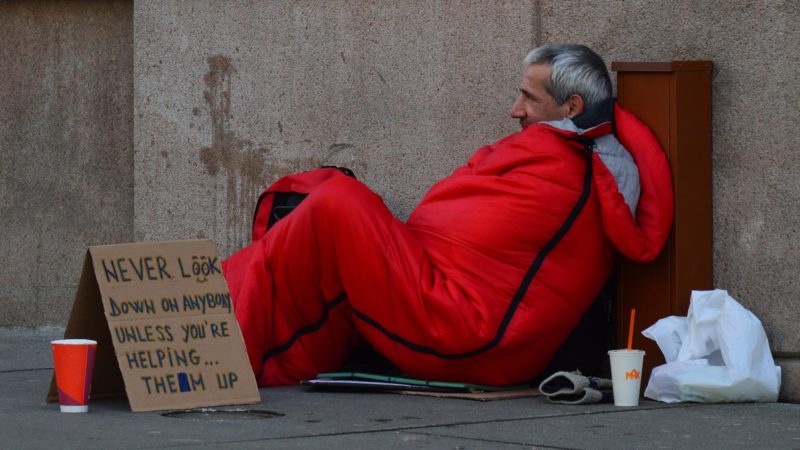
The political turmoil of recent years has left Labour members, and the Labour leadership, waiting eagerly at the sidelines. Waiting for the next Labour government. So hopeful and impatient is this call, and so obsessed are the media with Westminster personalities, that we forget a simple truth – Labour is already in power across huge parts of the UK. Labour politicians are running local councils across the country, and our police and crime commissioners and mayors oversee policing for over half of the population.
Labour exists to fight for a fair and equal society. It is difficult to find any group of people more marginalised, stigmatised and unfairly treated than those finding themselves homeless or suffering from addiction. Labour MPs have vowed to reverse the appalling cuts to services that support this group. Housing benefit cuts that hit the most disadvantaged, drug treatment cuts that have directly correlated with record deaths by overdose, and closures of women’s refuges have all been led by an austerity agenda that continues to force impossible choices on local councils.
Labour is rightly challenging that agenda, but must continue to hold true to the values of equality and fairness where the party is already in power. This means Labour PCCs need to resist the orthodoxy of ‘enforcement’, criminalising and perpetually moving along vulnerable people. Meanwhile, Labour councils must prioritise their efforts to provide housing, treatment and support to those who rarely vote and may not always be ready to accept help.
There are countless reasons for which somebody sleeping rough or with a problematic addiction might be reluctant to engage with support services. Many have a history of being criminalised or let down by professionals all their lives. Refusal of support does not mean a person is a criminal, nor does it mean we can ignore their suffering. If an offer of support has been refused, Labour politicians must lead the way in improving their offer.
And there are countless reasons for which a person could find themselves living on our streets. Some are victims of domestic violence who, having found the courage to escape their abusers, have been unable to get the support they need. Others are former members of our armed forces, who have struggled to readjust following their time serving our country. A disturbingly high number are actually the children of the state, care-experienced young people of whom local councils are supposed to be taking care as their own.
Homelessness and addiction can often go hand in hand, and when someone suffers from both, they are at a much higher risk of death and serious harm. Recently, these risks have been increasing. Drug-related deaths of people who are homeless increased by 52% between 2012 and 2017. On average, people who are homeless die at just 44 years old.
The chaotic lives of people suffering from addiction can lead them into homelessness, while the unbearable situation of homelessness can turn people towards drug use and dependency. Neither homelessness nor addiction are a ‘choice’, and yet in our current system both are very much punishable by the state.
People rough sleeping or begging in Labour PCCs’ areas are still being arrested under the Vagrancy Act 1824, pre-Victorian powers that label vulnerable people as ‘rogues and vagabonds’. Public Space Protection Orders, pushed through by some Labour councils, are still threatening to impose serious fines on rough sleepers seen to be ‘passively begging’, inevitably criminalising them when those fines go unpaid.
How do we make sure that Labour councils, PCCs and mayors are always leading the way to build a compassionate, fair and equal society? It could start with you. If you take all or any of the steps listed below, your effort will be contributing to the national grassroots movement for something better:
- Join the Labour Homelessness Campaign to stand up for the rights of the most marginalised.
- Get involved with the Labour Campaign for Drug Policy Reform, by attending one of our public events or submitting your views directly.
- Fight any and all efforts, including by Labour councils, to introduce powers that further marginalise or criminalise vulnerable people. Liberty has lots of advice on how to challenge Public Space Protection Orders in your area.
- Write to your local PCC. Explain that you expect your police force to be offering the hand of friendship to those in need. Arrests, court dates, banning orders and imprisonment do nothing to solve issues of homelessness and addiction.
- Volunteer or donate to help support people suffering from homelessness and/or drug addiction in your area – whether in your local hostel, rehab, food bank or outreach service. A quick search online will give you plenty of ways to physically help.
- Help in a crisis – if you see someone in trouble from an overdose, be sure to call 999 and stay with them, if you don’t know first aid then watch this video for the basics on the recovery position. If you think there is a chance you might encounter a heroin overdose, then contact your local drug treatment service for training in ‘naloxone’, a life-saving medication that can block overdoses.
We cannot take it for granted that Labour politicians will do a better job to support the vulnerable than any other political party. We have to prove it, every day and in every area where we are in power. I hope that you can join me in making that case.




More from LabourList
Letters to the Editor – week ending 15th February 2026
‘Labour council candidates – it’s tough, but all is not lost’
‘Labour won’t stop the far right by changing leaders — only by proving what the left can deliver’